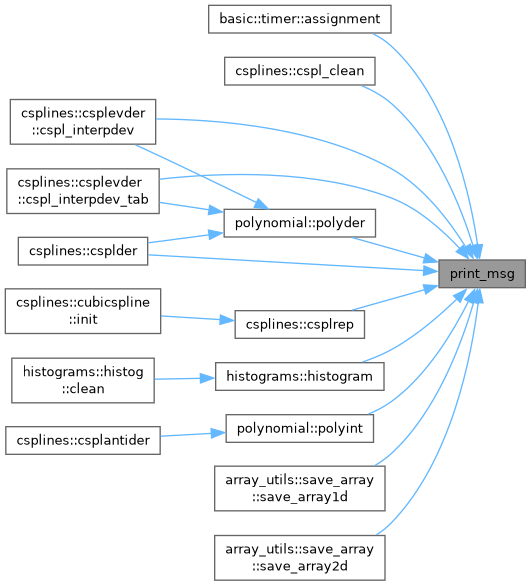This module will provide some basic convenience routines Description. More...
Data Types | |
| type | timer |
| Simple timer. Holds start-time, stop-time, and time-difference. More... | |
Functions/Subroutines | |
| integer function, public | is_inf (x) |
| is_inf Checks if the argument is plus or minus infinite. | |
| subroutine, public | print_msg (msg, sub, errcode, unit) |
| Print a message, and optionally stop the program. | |
Detailed Description
This module will provide some basic convenience routines Description.
Eventually it will provide:
- types (real, double precision, infinite, etc)
- Basic error handling (defining output for warning and errors) To improve maybe look into https://docs.python.org/3/library/warnings.html
- Some basic file handling (some os.path functionality) (Really needed?)
- Some sys functionality (stdin, stdout, stderr via iso_fortran_env)
- Timers, timestamp (a simple implementation)
For numerical work we need to use specific minimal precision which is machine-and-compiler-independent. The real type definitions emphatize this. The names are sp and dp are chosen only by tradition/historic reasons. We define types with at least 15 decimal places and exponent range of 307. (see for instance http://fortranwiki.org/fortran/show/Real+precision). We also could use c_double from module iso_c_binding (fortran 2003 and later)
Function/Subroutine Documentation
◆ is_inf()
| integer function, public is_inf | ( | real(dp), intent(in) | x | ) |
is_inf Checks if the argument is plus or minus infinite.
- Returns
- Returns 0 if is finite, -1 if is minus-infinite and +1 if is plus-infinite
- Parameters
-
[in] x Variable to test
References zero.
Referenced by timer::assignment().

◆ print_msg()
| subroutine, public print_msg | ( | character(len=*), intent(in) | msg, |
| character(len=*), intent(in), optional | sub, | ||
| integer, intent(in), optional | errcode, | ||
| integer, intent(in), optional | unit ) |
Print a message, and optionally stop the program.
If errcode > 0 stop the program
Examples of use:
The first three examples print the given message and stop the program. The next two will keep running after printing the message to stderr. The last will keep running after printing the message to a previously open file.
- Parameters
-
[in] msg Message to print on stderr [in] sub Routine name. Default = None [in] errcode Error code. Default = 0 [in] unit Unit to write. Default = stderr
Referenced by timer::assignment(), csplines::cspl_clean(), csplevder::cspl_interpdev(), csplevder::cspl_interpdev_tab(), csplines::csplder(), csplines::csplrep(), histograms::histogram(), polynomial::polyder(), polynomial::polyint(), save_array::save_array1d(), and save_array::save_array2d().

